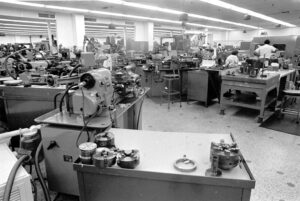Among the attendees of Tallevast@20: Manatee County Commissioner George Kruse.
By Ramon Lopez
Original Air Date: Apr. 26, 2024
Host: A conference this week rekindled awareness about 20 years of efforts to clean up the toxic mess brought by a military contractor to the African American neighborhood of Tallevast. Ramon Lopez reports.
Ramon Lopez: This is a Tale of Tallevast in three parts: past, present and future.
The disadvantaged, African-American town is located in south Manatee County, just east of Sarasota Bradenton International Airport. The town of Tallevast includes about 75 or so households.

Interior of ABC facility, back when it was operational
The American Beryllium Company built a plant in the heart of the community. From the late 1950s until 1996, the plant fabricated beryllium machine parts, including components for nuclear warheads. Poor management of hazardous waste and discharges from ABC’s wastewater treatment system contaminated the local groundwater with chlorinated solvents, poisoning local drinking water wells. A remedial action plan for cleanup is underway, but at a snail’s pace.
Last Saturday, April 20th, The University of South Florida’s Anthropology Department held an all-day conference at its Sarasota-Manatee campus. Attendees included academics, public health experts, and even a local politician: George Kruse, Manatee County District 7’s commissioner. Dr. Christian Wells is the Director of the Center for Brownfield Research at USF Tampa. The meeting was entitled: Tallevast at 20 years, from contamination to cleanup and beyond. Past, present, and future.
The idea, says Wells, was to celebrate, contemplate and help lift up the community of Tallevast. Attendees shared the extensive research, discussed the dire health outcomes, the cleanup process, and the strategic plan for redevelopment. Dr. Wells said he was surprised that Kruse would attend the event.
Christian Wells: I was also really excited to have Commissioner Kruse here. That was kind of a bit of a coup. I thought no way, because we contacted every commissioner, everybody that’s elected in the world. And he said yes, absolutely. And he showed up and I thought, okay, this guy’s going to come in and say, “Welcome to Manatee County. Isn’t it great? Uh, I gotta go, bye!”
He stuck around. He sat in the back and he listened. He listened to a lot of things that people were saying, and he talked to me, and he talked to other people during the break, and he didn’t duck out. He kept listening, and he said, that’s really what I want to do here.
And he said, to be honest with you, as county commissioner, I didn’t know. So many people that I spoke to today said, I didn’t really know. And putting them on the spot is a really great tactic to do. Because, in order to say something halfway intelligent, they have to read about the problem and learn about it, and then they know. So that when they go to the table, when they go to board of county commissioners meetings, they were more informed about it.
RL: Wells said the plenary speaker was Dr. Deanna Wathington; She’s president-elect of the American Public Health Association. She spoke on health equity as it related to this tiny town in the sunshine state.
CW: I’m grateful to Deanna for coming and talking to us about health equity. She confided in me more than once, “I’m really nervous about doing this, I really am not sure if I should do this.” Because she was talking about structural racism. And she knew that there were folks in the room that maybe were uncomfortable hearing about it, or uncomfortable listening to it or talking about it.
But she did it, and she had the courage to do it. We need more people to have that courage to stand up and do it. It’s really critical for people to trace the historical connections of why these things happen. They don’t happen on accident. They happen because they’re politically decided. And you really have to historicize these to understand them, because you can’t evolve this. You can’t have a sustainable future if you don’t understand the history of it.
RL: Cynthia Peurifoy, who’s retired from the US Environmental Protection Agency, also spoke.
Cynthia Peurifoy: Politics continue to play bad things on environmental justice communities. I think now is a good time to knock on the door again, and I’ll start at the White House. Because they really are doing a great effort to support environmental justice. There is so much you can still do, and so much that can be done. And I think you’re on the right track.
RL: This is Ramon Lopez for WSLR News.
WSLR News aims to keep the local community informed with our 1/2 hour local news show, quarterly newspaper and social media feeds. The local news broadcast airs on Wednesdays and Fridays at 6pm.